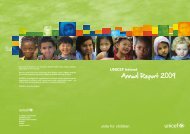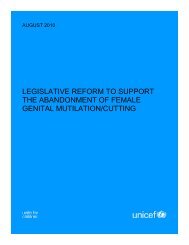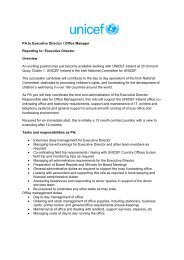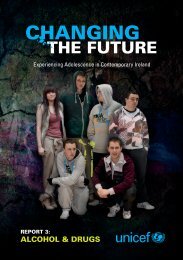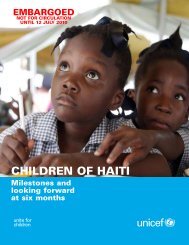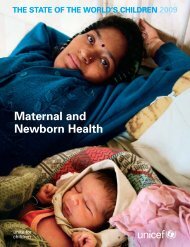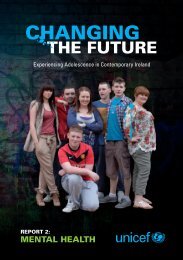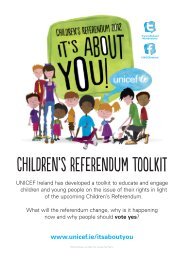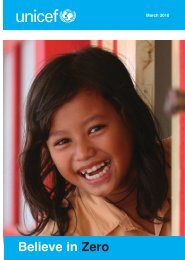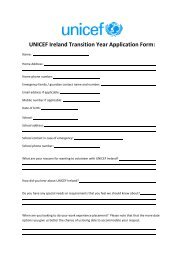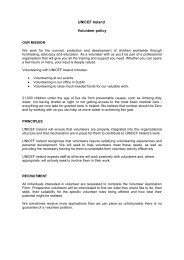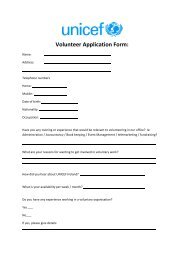Humanitarian Action for Children 2011 - Unicef
Humanitarian Action for Children 2011 - Unicef
Humanitarian Action for Children 2011 - Unicef
- No tags were found...
Create successful ePaper yourself
Turn your PDF publications into a flip-book with our unique Google optimized e-Paper software.
Congo<strong>Children</strong> and women in crisisIn 2010, more than 114,000 people fled the Democratic Republic of the Congo to shelter in theCongo. 1 Although arrival of refugees seems to have stabilized since May, there is currently no<strong>for</strong>eseeable timetable <strong>for</strong> safe return due to ongoing political strife and violence in their homecountry. Refugees in the Congo, of whom an estimated 80 per cent are women and children, 2live in conditions that increase the risk of undernutrition and illness. Limited access to water,hygiene and sanitation facilities <strong>for</strong> many refugees creates an opening <strong>for</strong> the spread ofwaterborne diseases. Recurrent floods also take their toll: Thousands of children have a hardtime getting to school, and around 350,000 people are at risk of cholera. 3 In November 2010,the Congo experienced a deadly outbreak of wild poliovirus, with nearly all cases reportedfrom the port city of Pointe Noire. By early December, 498 cases and 209 deaths had beenreported, mainly among young adults. Logistical constraints related to climate, limited airaccess and minimal air cargo access to some areas make providing humanitarian relief in theCongo extremely difficult.<strong>Humanitarian</strong>funding at work:Highlights from 2010In 2010, UNICEF estimatedUS$5,973,032 was needed<strong>for</strong> aid in the Congo. As ofOctober 2010, US$1,995,016had been received, or33 per cent of the goal,partly through two roundsof UN Central EmergencyResponse Fund grants.With these funds, UNICEFprovided essential drugsand equipment <strong>for</strong> safechildbirth and basic surgicalinterventions to benefit2,400 refugee women and12,000 children. Successfultreatment of severe acutemalnutrition was providedin 30 health centres. Out of18 wells planned in Betou,Dongou and Impfondo, 15were completed. UNICEFsupported the education of8,593 preschool-age refugeechildren by providing102 school, 72 recreationaland 60 early childhooddevelopment kits. UNICEFpre-positioned protectionpackages consisting ofkits <strong>for</strong> HIV post-exposureprophylaxis (PEP) to assistwomen and children whoare survivors of violence,reunification kits to facilitatereunification of familiesin case of separation andrecreational materials <strong>for</strong>children and women.Meeting urgent needs and building resilience in <strong>2011</strong>Although the cluster approach has not been <strong>for</strong>mally adopted in the Congo, within the UNcountry team UNICEF is the agreed sector lead in WASH, while it coordinates the educationsector with UNESCO and provides significant support in the education and protection sectors.In <strong>2011</strong>, UNICEF will continue to work with the Government of the Congo, other UN agenciesand NGOs in addressing the needs of 210,000 people, including 80,095 boys and 74,375 girls.• Nutrition interventions (prevention, detection and treatment of undernutrition) andsurveillance will benefit 69,470 children as well as 45,000 women who are pregnant orbreastfeeding their infants. In addition, they will have improved access to primary health carethrough provision of vaccines, essential drugs, cholera kits and other health commodities.• Clean water and proper sanitation facilities are indispensable to health. WASH ef<strong>for</strong>ts willfocus on refugees to maintain their existing water supplies and bring clean water andsanitation to 25,000 previously inaccessible refugee families.• Some 85,000 children of preschool and primary-school age will access quality educationopportunities, including child-friendly emergency education programmes. UNICEF will helpconstruct 83 new temporary learning centres, maintain the 63 existing ones, and promotekey hygiene practices through peer education.• Two drop-in centres <strong>for</strong> psychosocial care of children and women survivors of violence andsexual abuse will open in Impfondo and Betou; protection kits and recreational materials willbe pre-positioned at the Departmental Direction of Social Affairs in Impfondo.• UNICEF, in close collaboration with the government and the World Health Organization, issupporting mass polio immunization campaigns targeting the entire population by ensuringavailability of vaccines, as well as social mobilization including hygiene promotion.UNICEF will continue to do so until the wild poliovirus is interrupted.Funding requirements <strong>for</strong> <strong>2011</strong>UNICEF is requesting US$4,830,000 to carry out its planned activities <strong>for</strong> the Congo in <strong>2011</strong>.Prompt response on behalf of donors to the desperate needs of women and children will assistin improving their well-being and development.More in<strong>for</strong>mation on details on achievements of 2010 and the humanitarian actionplanned <strong>for</strong> the Congo in <strong>2011</strong> can be found at www.unicef.org/hac<strong>2011</strong>.1. UNHCR, “UNHCR gains access to 35,000 refugees in RoC”, 4 May 2010. See http://www.unhcr.org/4be00db16.html2. UNHCR, “UN seeking funding <strong>for</strong> tens of thousands of Congo refugees”, 9 March 2010. See http://www.unhcr.org/4b9626669.html3. Some quarters of Brazzaville and Pointe Noire, and three districts located in Pool and Bouenza are consideredas at risk <strong>for</strong> cholera. Population figures are from the 2007 census, preliminary results.UNICEF EMERGENCY NEEDS FOR <strong>2011</strong> (in US dollars)Total $4,830,000384,000 Health350,000Child protection983,000 Nutrition2,293,000 WASH820,000 Education66 <strong>2011</strong> UNICEF <strong>Humanitarian</strong> <strong>Action</strong> FOR CHILDREN | www.unicef.org/hac<strong>2011</strong>Congo




